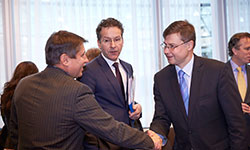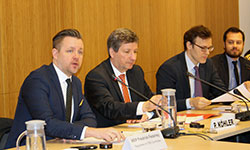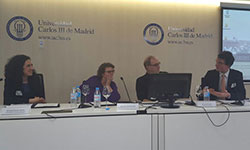BusinessEurope Headlines No. 2016-06
Emma Marcegaglia: a common vision key for the future of Europe
 Europe is at a crossroads. Political polarisation, economic fragmentation and security threats bring many uncertainties. This is a serious reason of concern for business. Now is a time for European solutions. Having a strong presence in Brussels is vital to ensure that the business community speaks with one voice. Having a common vision of the future is particularly important in these testing times. These were the messages BusinessEurope President Marcegaglia conveyed during the opening of the House of German Business in Brussels, together with BDI’s President Ulrich Grillo, BDA’s President Ingo Kramer, European Parliament President Schulz and German Ambassador Reinhard Silberberg.
Europe is at a crossroads. Political polarisation, economic fragmentation and security threats bring many uncertainties. This is a serious reason of concern for business. Now is a time for European solutions. Having a strong presence in Brussels is vital to ensure that the business community speaks with one voice. Having a common vision of the future is particularly important in these testing times. These were the messages BusinessEurope President Marcegaglia conveyed during the opening of the House of German Business in Brussels, together with BDI’s President Ulrich Grillo, BDA’s President Ingo Kramer, European Parliament President Schulz and German Ambassador Reinhard Silberberg.
Contact: Daniele Olivieri
European Council 18-19 February: now is a time for European solutions
 Weak growth, high debt, persistent unemployment, an unprecedented influx of refugees and migrants, an existential referendum about UK membership of the European Union and a general rise in nationalism across Europe are a very dangerous compound. Improving competitiveness is key. Doing so is not only a key pillar of the negotiations ahead of UK’s referendum on its EU membership. It is also in the interest of the European Union as a whole. “Tackling the refugee crisis is an immediate urgency and ensuring free movement in the Schengen area is a key priority for European business. Putting our economic house in order will help us face all these challenges”, BusinessEurope Director General Markus J. Beyrer said at a press briefing ahead of the European Council meeting on 18-19 February 2016.
Weak growth, high debt, persistent unemployment, an unprecedented influx of refugees and migrants, an existential referendum about UK membership of the European Union and a general rise in nationalism across Europe are a very dangerous compound. Improving competitiveness is key. Doing so is not only a key pillar of the negotiations ahead of UK’s referendum on its EU membership. It is also in the interest of the European Union as a whole. “Tackling the refugee crisis is an immediate urgency and ensuring free movement in the Schengen area is a key priority for European business. Putting our economic house in order will help us face all these challenges”, BusinessEurope Director General Markus J. Beyrer said at a press briefing ahead of the European Council meeting on 18-19 February 2016.
Read more or contact: Thérèse de Liedekerke
Member states should continue implementing structural reforms
 "Despite financial market turbulence, the gradual recovery of the EU and Euro-area is expected to continue", BusinessEurope Director General Markus J. Beyrer emphasised at the Macroeconomic Dialogue (MED) meeting at political level on 11 February. However, given continuing geopolitical uncertainties, which can weigh on business confidence, it is important that member states continue to press ahead with the implementation of structural reforms. It is clear that countries such as Ireland, Spain and Latvia, which undertook structural reforms in the past, have now begun to reap the benefits.
"Despite financial market turbulence, the gradual recovery of the EU and Euro-area is expected to continue", BusinessEurope Director General Markus J. Beyrer emphasised at the Macroeconomic Dialogue (MED) meeting at political level on 11 February. However, given continuing geopolitical uncertainties, which can weigh on business confidence, it is important that member states continue to press ahead with the implementation of structural reforms. It is clear that countries such as Ireland, Spain and Latvia, which undertook structural reforms in the past, have now begun to reap the benefits.
Read more or contact: Frederik Lange
Photo © The European Union
EU ETS reform discussed with MEP Federley
 On 16 February, Fredrick Federley, rapporteur on the EU ETS reform in the European Parliament ITRE Committee, exchanged views with members of our Industrial Affairs Committee. BusinessEurope presented its newly adopted position paper on the post-2020 reform of the emissions trading scheme (ETS). It makes a number of recommendations to improve the European Commission proposal, which fails to strike the right balance for all sectors covered under the emissions trading scheme. As a result, BusinessEurope tables seven key recommendations to make the reform fit for purpose: changing the fixed ratio between auctioning and free allocation; adjusting better allocation; ensuring bottom-up realistic benchmarks; providing flexibility on carbon leakage; harmonising compensation for indirect costs; improving the innovation fund and simplifying the ETS for small emitters. "This was an important meeting. For me as rapporteur”, MEP Federley said, “it is important to keep an open dialogue with all stakeholders."
On 16 February, Fredrick Federley, rapporteur on the EU ETS reform in the European Parliament ITRE Committee, exchanged views with members of our Industrial Affairs Committee. BusinessEurope presented its newly adopted position paper on the post-2020 reform of the emissions trading scheme (ETS). It makes a number of recommendations to improve the European Commission proposal, which fails to strike the right balance for all sectors covered under the emissions trading scheme. As a result, BusinessEurope tables seven key recommendations to make the reform fit for purpose: changing the fixed ratio between auctioning and free allocation; adjusting better allocation; ensuring bottom-up realistic benchmarks; providing flexibility on carbon leakage; harmonising compensation for indirect costs; improving the innovation fund and simplifying the ETS for small emitters. "This was an important meeting. For me as rapporteur”, MEP Federley said, “it is important to keep an open dialogue with all stakeholders."
Read more or contact: Alexandre Affre
Opportunities and challenges of digital transformation
 Digitalisation is at the core of the ongoing transformation of European enterprises and may have a cross-sectoral positive impact far beyond improving production efficiency. Speaking at the European Commission high-level conference on digital transformation of European industry on 16 February, Director General Markus J. Beyrer said: “Action at EU level is needed to bundle Europe’s strengths and create a successful model for digital transformation to regain global competitiveness and deliver growth and jobs”. He also stressed that flexibility and adaptation are key to a successful European digitalisation roadmap, that needs to set out the right conditions for innovation, make the most of the data potential, and ensure global convergence of rules and standards, while providing adequate responses to labour markets and skills needs.
Digitalisation is at the core of the ongoing transformation of European enterprises and may have a cross-sectoral positive impact far beyond improving production efficiency. Speaking at the European Commission high-level conference on digital transformation of European industry on 16 February, Director General Markus J. Beyrer said: “Action at EU level is needed to bundle Europe’s strengths and create a successful model for digital transformation to regain global competitiveness and deliver growth and jobs”. He also stressed that flexibility and adaptation are key to a successful European digitalisation roadmap, that needs to set out the right conditions for innovation, make the most of the data potential, and ensure global convergence of rules and standards, while providing adequate responses to labour markets and skills needs.
Read more or contact: Guido Lobrano
Beware the combined effects of financial legislation
 BusinessEurope has responded to the European Commission’s call for evidence regarding the impact and interaction of financial legislation, providing concrete illustrations. The EU and member states should carefully assess the need for and impact of new legislation, to focus on cumulative effects and the bedding-in of the reforms of recent years. A higher degree of consistency between regulatory measures is essential to ensure investment and a properly functioning Capital Markets Union.
BusinessEurope has responded to the European Commission’s call for evidence regarding the impact and interaction of financial legislation, providing concrete illustrations. The EU and member states should carefully assess the need for and impact of new legislation, to focus on cumulative effects and the bedding-in of the reforms of recent years. A higher degree of consistency between regulatory measures is essential to ensure investment and a properly functioning Capital Markets Union.
Read more or contact: Erik Berggren
Labour market reforms needed to increase job content of economic growth
 Labour market reforms have an important role to play in winning the battle for employment and improve the adaptability of enterprises and workers to changing circumstances globally. As part of a reform partnership, European and national policy-makers and social partners need to work together to address the deeply rooted structural reasons for unemployment in Europe, such as excessively rigid regulations on employment contracts, skills shortages and mismatches, and insufficient incentives to work through tax and benefits systems. These were the key messages given by Maxime Cerutti, BusinessEurope Social Affairs Director, at a seminar on labour law reforms and social dialogue in the EU organised in Madrid on 12 February by the University of Amsterdam and the Madrid University Carlos III. Unemployment is a longstanding challenge in Europe, exacerbated by the recent crisis. In December 2015, 22 million people were unemployed in the EU. This is 2 million fewer unemployed people than one year before. But there are still 6 million more people unemployed in the EU than in March 2008, before the crisis hit. In comparison, since 2008 over 3 million new jobs were created in the United States.
Labour market reforms have an important role to play in winning the battle for employment and improve the adaptability of enterprises and workers to changing circumstances globally. As part of a reform partnership, European and national policy-makers and social partners need to work together to address the deeply rooted structural reasons for unemployment in Europe, such as excessively rigid regulations on employment contracts, skills shortages and mismatches, and insufficient incentives to work through tax and benefits systems. These were the key messages given by Maxime Cerutti, BusinessEurope Social Affairs Director, at a seminar on labour law reforms and social dialogue in the EU organised in Madrid on 12 February by the University of Amsterdam and the Madrid University Carlos III. Unemployment is a longstanding challenge in Europe, exacerbated by the recent crisis. In December 2015, 22 million people were unemployed in the EU. This is 2 million fewer unemployed people than one year before. But there are still 6 million more people unemployed in the EU than in March 2008, before the crisis hit. In comparison, since 2008 over 3 million new jobs were created in the United States.
Contact: Guillaume Cravero
STEM skills a key factor for Europe's competitiveness
 Increasing the number of people with science, technology, engineering and mathematics (STEM) related skills and competences is a key factor in strengthening Europe's competiveness vis-à-vis its global competitors. This was the main message given by Robert Plummer, Adviser for social affairs, at a meeting of the EU STEM Coalition in Amsterdam on 16 February. Furthermore, the acquisition of STEM skills needs to be integrated throughout education and training curricula, starting at primary school. This should go hand in hand with strategies to develop digital skills, such as basic coding, during school level education. Policies to address these points should be a central aspect of the European Commission's proposed skills agenda to be published in the spring.
Increasing the number of people with science, technology, engineering and mathematics (STEM) related skills and competences is a key factor in strengthening Europe's competiveness vis-à-vis its global competitors. This was the main message given by Robert Plummer, Adviser for social affairs, at a meeting of the EU STEM Coalition in Amsterdam on 16 February. Furthermore, the acquisition of STEM skills needs to be integrated throughout education and training curricula, starting at primary school. This should go hand in hand with strategies to develop digital skills, such as basic coding, during school level education. Policies to address these points should be a central aspect of the European Commission's proposed skills agenda to be published in the spring.
Contact: Robert Plummer
Tax policy group discusses anti-tax avoidance package with European Commission
 Uwe Ihli, Head of Sector, Corporate tax directives & Common Consolidated Corporate Tax Base, DG TAXUD, joined BusinessEurope at its tax policy meeting on 16 February 2016 to discuss the European Commission’s anti-tax avoidance package launched in January 2016. While sharing the Commission’s goal of reducing tax fraud and evasion, a number of the 45 participants articulated businesses concerns about aspects of the package. In particular, BusinessEurope believes measures should be taken forward on a global basis to avoid the EU being put at a competitive disadvantage either by the EU adopting OECD anti-BEPS agreement without proper implementation elsewhere in the OECD, or through the EU unilaterally adopting measures beyond those agreed at the OECD. Members also raised concerns that the Commission has not followed its own guidelines in developing an impact assessment for this very important and far-reaching initiative.
Uwe Ihli, Head of Sector, Corporate tax directives & Common Consolidated Corporate Tax Base, DG TAXUD, joined BusinessEurope at its tax policy meeting on 16 February 2016 to discuss the European Commission’s anti-tax avoidance package launched in January 2016. While sharing the Commission’s goal of reducing tax fraud and evasion, a number of the 45 participants articulated businesses concerns about aspects of the package. In particular, BusinessEurope believes measures should be taken forward on a global basis to avoid the EU being put at a competitive disadvantage either by the EU adopting OECD anti-BEPS agreement without proper implementation elsewhere in the OECD, or through the EU unilaterally adopting measures beyond those agreed at the OECD. Members also raised concerns that the Commission has not followed its own guidelines in developing an impact assessment for this very important and far-reaching initiative.
Read more or contact: Mafalda Moz Teixeira
Calendar
- 22-26 February: TTIP - 12th round of talks, Brussels
 23 February: international conference on enforcement in a Europe without borders, Amsterdam
23 February: international conference on enforcement in a Europe without borders, Amsterdam- 23-24 February: Citizens' Energy Forum 2016, London
- 24-25 February: European Parliament plenary sitting, Brussels
- 25 February: Economic diplomacy and foreign policy: friends or foes?, Brussels
- 26 February 2016: general elections in Ireland
Contact: BusinessEurope Headlines